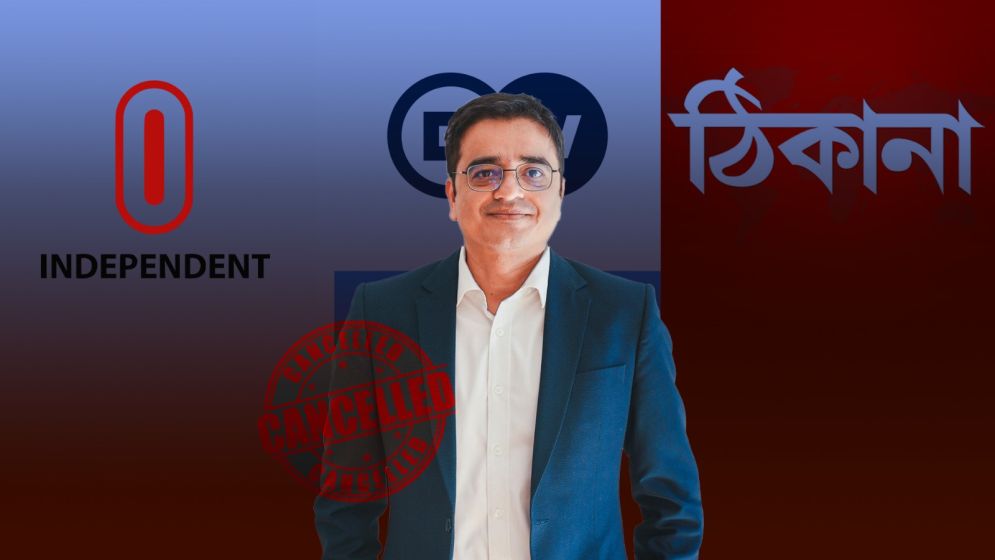 Abu Jakir
Abu Jakir
On Thursday, during his popular talk show Thikanai Khaled Muhiuddin, journalist and well-known host Khaled Muhiuddin made a faux pas.
His guest on the show was Dr. Ali Riaz, the head of the Constitution Reform Commission and a highly respected academic.
In his trademark breezy and informal style—perhaps a bit too casual for the occasion—Khaled attempted to draw a comparison between the “media restrictions” faced post-August 5th and those imposed during the 15 years of autocratic rule under the ousted dictator Sheikh Hasina, who fled the country following a major uprising.
Khaled, wearing a sharp navy-blue suit and a checkered tie, argued that both he and other voices critical of the Hasina government experienced little restriction on their freedom of expression during her regime—at least when comparing the “sense of freedom” to the current situation.
He argued that they had been able to publish “considerable” amounts of news exposing the government’s corruption, citing examples such as the infamous “pillow corruption” scandal surrounding the Rooppur nuclear plant and the “gold medal” scandal involving freedom fighters.
Professor Riaz, always calm and composed, firmly rejected Khaled’s claim.
He explained how his own books critical of the Hasina regime were not even considered by Bangladeshi publishers, underscoring the severe limitations on free expression.
At one point, Professor Riaz, though maintaining his composure, became visibly frustrated and told Khaled, “You are rooting for fascism, Khaled. In defending what happened during the Hasina regime, you are doing something very wrong.”
For a journalist and talk show host of Khaled’s stature, this moment marked a significant turning point.
It could be seen as the moment when Bangladesh’s most prominent figure in broadcast journalism was, in a sense, “cancelled.”
Why the cancellation was in the offing
Cancel culture—which refers to the public shaming or ostracizing of someone due to their offensive or objectionable behavior—is often seen as a hallmark of Gen-Z.
Yet, Khaled Muhiuddin, as brilliant and capable a journalist as he is, seems to have forgotten that it was Gen-Z who led the groundbreaking uprising against the iron-fisted Hasina regime and effectively “cancelled” it within a mere three weeks.
Khaled’s own cancellation had long been in the making, though.
Just two days earlier, the 50-year-old host, known for his sly boyish smile and dry humor, essentially bullied Nasiruddin Patwary, the convenor of the Jatiyo Nagorik Committee, during his talk show.
Throughout his career hosting talk shows—both for Bangladesh’s Independent Television and global outlets like DW, where he led the Bangla Division—Khaled has interrogated numerous powerful figures, including key members of the ousted Awami government, with probing and often critical questions.
But with Nasiruddin Patwary, he didn’t ask tough questions. Instead, he adopted a big-brother-like approach, first patronizing him as less experienced and less capable, then swiftly losing his temper—something totally unbecoming for a TV host.
The irony is that the central point Khaled was trying to make—about the media and journalists facing a similar level of threat and self-censorship under the interim government and student-led “auxiliary power,” which is overseeing various unwarranted activities under the guise of “nation-building”—was completely undermined by his own behavior.
The way he bullied Nasiruddin and complained about media freedom to Professor Riaz, using language that was at times borderline crude, completely contradicted his own argument in a rather comical fashion.
Cancelled for all the right reasons…
Had Khaled Muhiuddin ever dared to display such a bullying attitude toward anyone affiliated with the Awami regime while it was in power, and gotten away with it?
The answer is rhetorical—he never attempted it, knowing full well the repercussions such actions would have had, not just for him, but for his family as well.
The fact that Khaled Muhiuddin is now able to act in such a manner—fully aware that there will be no consequences for his actions—serves as a testament to the unrestrained freedom of expression that the media currently enjoys following the ousting of Sheikh Hasina.
Khaled knows well that he’s not at risk of being targeted by dubious provisions like the Cyber Security Act, Digital Security Act, or Section 57 of the Information and Communication Technology Act, which could have been used to prosecute him in the past.
He is fully aware of this and yet chose to make “wrong and misleading” comparisons. What’s worse is that he believes he has the moral high ground by making such comparisons.
While the interim government is far from perfect—its incompetence and inexperience have become increasingly apparent with each passing day—there is a clear intention within the government to correct its own mistakes.
Moreover, the interim government has shown an unwavering commitment to ensuring media and press freedom.
Figures like Khaled Muhiuddin are well aware of the reasons behind the cancellation of accreditation cards for several journalists (which the PID is now considering reinstating) or Hasnat Abdullah’s efforts to “remove certain journalists” from a particular media house.
They understand full well how media outlets operated under the Awami regime, parroting narratives that bolstered a government which, initially autocratic, evolved into a fascist regime and, in its later stages, a complete mafia state.
And yet, despite this knowledge, Khaled made such comparisons. There’s no doubt that his “cancellation” was entirely justified.
Bangla Outlook









